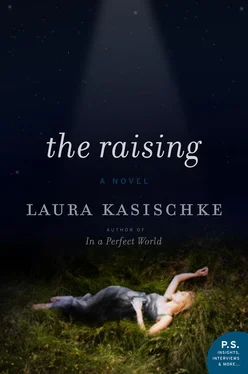He had no idea, he realized, and remembered fifth grade. Map reading. He couldn’t do it. He tried to fake it (“Mongolia?”), which resulted in gales of laughter. This was what it would be like in Limbo, he realized. It could go either way—everything that mattered.
“Nicole, I—” he blurted with no idea what he was going to say. Luckily, she held up a hand to stop him.
“You’re probably right,” she said. “I probably don’t want to know. Or, actually, I think I probably do know.”
Craig took a step back. He was afraid to look at anything but the place directly between Nicole’s eyes. He was wearing an army green T-shirt, and he was sure there must be spreading triangles of sweat at his pits. Nicole wrapped her arms around herself, holding on to her own arms hard. Her knuckles went white.
“You liked her first, didn’t you?” she asked, a little sob in her voice. “ She’s why you were in the study group, and then you found out that she’s got that boyfriend from Grosse Isle. That Princeton guy.”
Craig took a trembling breath, trying not to explode with relief. It was like watching in the rearview mirror as the tanker that had been barreling down on you flipped straight into a ditch. “No!” he said, finding that he could blink again because now he was actually telling the truth. “No! My God! Nicole, I was knocked out by you the first time I saw you. You were the only reason I joined that group. I hadn’t even seen your roommate. I’ve never felt this way about any girl. Josie? Jesus. No…”
“Craig,” Nicole said. “I know you love me now . But I also know that there are other girls, girls who are prettier, and—”
This time Craig did explode, with laughter. He put his hands in his hair, as if to keep his head on his neck, and then he rushed at her, lifted her off her feet, laughing and kissing her and twirling her around in his arms as the after-dinner crowd started pouring out of the cafeteria, which had just closed—all those faceless others splitting around him and Nicole, not even glancing at them, and Craig thought he could just hold her and kiss her there forever. She was laughing, too, and he hoped she thought he was so sweaty and his heart was beating so hard because it was so warm in the hallway, and because he was so in love.
That afternoon he didn’t say anything more about the paper roses, or the amount of her time they were going to take away from him between now and her formal (which she couldn’t even invite him to because he wasn’t in a frat: “I’m just going to go with a sister,” she’d assured him when he’d asked).
They kept walking, past their Starbucks, back to the dorm so she could start on the roses. They’d changed the topic to how crazy it was that someone had spray-painted a different word under every Stop sign in town, so the signs read, STOP WAR, STOP SHRUBBERY, STOP STOPPING, STOP UP, STOP OVER, STOP DIAPER RASH, etc. They speculated about which campus group would have done it, or if it was just one weird guy, or maybe high school students—who knew? Craig had his arms wrapped around her, and his mouth and nose were full of the smell and taste of her red wool scarf. His hands were so numb he had to look at them every few feet to make sure the trig book was still in them.
Then Craig saw him again: up ahead, that same guy who’d come out of the Omega Theta Tau house just before Nicole. He was walking out of the bank in his blue jacket, stuffing his wallet into the back pocket of his khaki pants.
“There he is again,” Craig said, pointing.
“Who?” Nicole asked absently. She wasn’t even looking in the direction he was pointing.
“That guy who was in your house. That man.”
Nicole looked around this time, seeming to scan the horizon, not finding anything of interest. “So?”
“I just want to know who he is,” Craig said. “Who is he, Nicole?”
“I wouldn’t know,” she said. “I can’t even see who you’re pointing at.” She was looking in the exact opposite direction. The guy turned around then, and Craig was sure he looked right at them, as if he’d known they were there, as if he were looking for them .
There was a patch on the guy’s jacket pocket. Craig could see it clearly now: “EMT.”
“He’s an ambulance driver or something,” Craig said, more to himself than Nicole.
“So?” she said.
“Why does he hang out at your sorority? Why is he always there?”
Nicole held a hand up to her forehead and looked in the wrong direction again, and then said, “I have no idea what you’re talking about Craig. There’s no EMT hanging out at the sorority.”
Craig looked at her and said, “How did you know he was an EMT?”
“You just said it,” she said, and seemed to stomp her foot a little in frustration. “Sheesh!”
“No, I didn’t,” Craig said. “I said ‘ambulance driver,’ after I saw there was an EMT patch on his pocket.”
“Same thing,” she said.
“It’s not,” he said.
She continued looking around, exactly where the guy was not standing, and then the guy turned his back and stepped into the street, and a white truck pulled into the intersection, blocking Craig’s view, and by the time it had passed, the man was gone and Craig was staring at nothing but a brick wall.
Nicole got on her tiptoes and kissed his cheeks. “Okay, I guess this is where we say good-bye,” she said. “You’re going back to Starbucks?”
“Without you?”
“Why not?” she asked. “You’ll study better without me there anyway. I’ll see you at dinner, okay?”
“Okay,” Craig said, feeling a little bit like he’d been duped in some kind of card trick—not an unpleasant one, just confusing—and then she was half-walking, half-skipping away from him in the direction of Godwin Hall.
Professor Polson’s lecture that day concerned the soul.
“In some cultures, you can never speak the name of the deceased person again because the soul might hear its name and come looking for its body. Or, worse, the body might come looking for its soul.
“In fact, the tradition of cremation, which seems to us one of the most modern means for dealing with human remains, has its origins in this impulse. If the body is burned to ashes, there can be no reinhabiting, no return.
“Some anthropologists believe that many mourning customs originally served the purpose of keeping the dead at bay. Schneerweiss—you read the translation of the article, right?—hypothesized that the reason widows were instructed to wear black for at least a year and to change their hairstyle was so as to be unrecognizable when their dead husbands came looking for them.
“Why,” Professor Polson asked, “might this be? Why would any self-respecting widow not be thrilled to have her dead husband return to her?”
Most of the class responded in unison, “Putrefaction!”
“Exactly. The fear, the aversion , that we think of as superstitious or religious is, in fact, based on physical reality. It’s based on experience. Difficult experience. So, primitive people, we see, cannot be so easily dismissed as the sort of fools we tend to think of them as. In actuality, they had a much closer, much more intimate experience with the dead than most of us will ever have—unless we go to war or into the mortuary arts. They knew what they were trying to avoid.”
She turned to the chalkboard, on which she’d written a quote from Thomas Mann, The Magic Mountain :
What we call mourning for our dead is perhaps not so much grief at not being able to call them back as it is grief at not being able to want to do so.
Читать дальше












